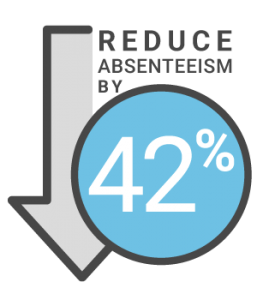Increasing Employee Engagement has a Positive Affect on Your Productivity and Turnover Rates. Here’s How to Increase it.
Actively disengaged employees total 18 percent of the workforce, and cost companies an estimated $450 billion to $550 billion in lost productivity each year. That productivity loss does not include loss from unengaged employees, which makes up an additional 52 percent of the workforce. Meaning that only 34 percent of employees are engaged in their work and company. This concerning percentage of employee engagement means your productivity, turnover rate, absenteeism, and employee enthusiasm is suffering.
 Employee Engagement Affects More than Company Culture
Employee Engagement Affects More than Company Culture
With companies losing a combined $11 billion annually to employee turnover, decreasing turnover rates within your company is essential. The Corporate Leadership Council reports that employee engagement is a major influencer in turnover rate, citing that engaged employees are 87 percent less likely to quit their organization than disengaged employees. Engaging employees also reduces absenteeism by 42 percent.
Production levels suffer when employees lack connection with their work and company too. In contrast to the companies losing up to $550 billion in productivity each year due to disengaged employees, companies who had highly engaged employees saw a productivity increase of 17 percent. When engaged employees are more productive, the company realizes a greater profit as well. Companies with engaged employees saw them observe higher standards for themselves and realized a 21 percent greater profit.
Employee engagement is no longer a question of whether it is beneficial, but instead how it can be achieved in your organization. At Employer Support Services, we help organizations achieve higher employee engagement. Follow the tips below and call us for more information on how to better your company.
 Improve Employee Engagement by Assigning a Specific Role
Improve Employee Engagement by Assigning a Specific Role
Employees are unique and each one carries a specific set of talents and skills. According to SHRM, there are two key elements employees need to feel satisfied with their jobs – a good relationship with their co-workers and an ability to use their skills at work. Discovering what talents your employees have and giving them the ability and autonomy to incorporate their skills into their jobs can increase engagement. For example, if your employee is exceptional at organization and enjoys planning parties or get togethers for friends or family, offer the opportunity for him or her to plan business excursions, employee outreach events, or client appreciation efforts. This makes employees feel like they are getting to use their hobbies at work.
Development efforts for a specific employee role is also important for employee engagement. LinkedIn shows that 94 percent of employees would stay longer at a company if the company invested in their development or skills learning efforts. To maintain a high employee retention rate, find out what skills your employees want to excel in and invest in their development.
Fostering Friendships in the Workplace Increases Engagement
Personal relationships with co-workers are another important factor in employee engagement. “Research has shown that employees’ engagement levels are often determined by the strength of their relationships with supervisors and co-workers,” says an SHRM report. People commit to people, and employees who foster relationships with each other have positive feelings toward work. When employees bond and collectively work toward a main goal and the company’s mission, they and the company succeed.
Much of engagement is emotional. Create opportunities for emotional engagement between employees such as hosting fun, relaxed interactions during or after work hours. Encourage employees to share and celebrate their life events and personal accomplishments as well.
 Compassionate Leadership Also Increases Employee Engagement
Compassionate Leadership Also Increases Employee Engagement
According to Gallup, employees who aren’t recognized are twice as likely to quit. Recognizing and giving feedback to your employees in the workplace makes them feel valued, which in turn increases their engagement levels. Implementing an employee recognition program for excellence on the job and an employee review program for identifying improvement opportunities can positively affect engagement. Employees who have a clear direction of how they fit into the goal of the company will feel that their work has meaning and will work harder toward progress.
Ensuring your employees are engaged in their work and in the company’s success results in greater productivity levels, greater profit, and less turnover. Increase your employees’ engagement at your organization by following the above suggestions and by calling Employer Support Services for more information on organization success. Call today at 225-364-3000.


